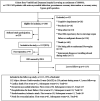Risk of recurrent cardiovascular events in coronary artery disease patients with Type D personality
- PMID: 37057178
- PMCID: PMC10088369
- DOI: 10.3389/fpsyg.2023.1119146
Risk of recurrent cardiovascular events in coronary artery disease patients with Type D personality
Abstract
Introduction: Data on the association between Type D personality, its traits negative affectivity (NA) and social inhibition (SI), and risk of major adverse cardiac events (MACE) in coronary outpatients is sparse. Furthermore, the associations between Type D subgroups and cardiovascular risk factors are largely unknown.
Methods: We investigated i) Type D personality, NA and SI and risk of recurrent MACE, and ii) the relationship between Type D subgroups and risk factors in a coronary population. This prospective cohort study included 1083 patients` median 16 months after a myocardial infarction and/or a revascularization procedure who were followed-up for 4.2 (SD 0.4) years. Type D personality was assessed by DS14. Anxiety and depression, statin adherence, and risk factors were assessed by patients' self-report and a clinical examination with blood samples. MACE, defined as cardiovascular death, myocardial infarction, revascularization, stroke or heart failure, were obtained from hospital records from index event to end of study lasting 5.7 years. Data were analyzed by Cox proportional hazard regression.
Results: In all, 352 MACE occurred in 230 patients after average 4.2 years follow-up. Higher NA score was associated with MACE after adjustment for age, risk factors and comorbidity (HR 1.02 per unit increase, 95% CI 1.00-1.05), whereas we found a weaker, not statistically significant estimated effect of higher SI score. After additional adjustment for symptoms of anxiety and depression, we found a weaker, not statistically significant association between NA and MACE (HR 1.01 per unit increase, 95% CI 0.98-1.05). Low statin adherence and smoking were more prevalent in the Type D and high NA group.
Discussion: Our results indicate that the NA trait is related to worse prognosis in outpatients with coronary artery disease.
Keywords: Type D personality; anxiety; cardiovascular risk factors (CVRFs); coronary artery disease; depression; recurrent cardiovascular events; secondary prevention.
Copyright © 2023 Torgersen, Sverre, Weedon-Fekjær, Andreassen, Munkhaugen and Dammen.
Conflict of interest statement
The authors declare that the research was conducted in the absence of any commercial or financial relationships that could be construed as a potential conflict of interest.
Similar articles
-
Predictive value of social inhibition and negative affectivity for cardiovascular events and mortality in patients with coronary artery disease: the type D personality construct.Psychosom Med. 2013 Nov-Dec;75(9):873-81. doi: 10.1097/PSY.0000000000000001. Epub 2013 Oct 25. Psychosom Med. 2013. PMID: 24163388
-
Type D personality as a risk factor for 3-year cardiovascular events in patients with coronary artery disease and their spouse: a prospective cohort study.Eur J Prev Cardiol. 2025 Apr 22;32(6):430-440. doi: 10.1093/eurjpc/zwae377. Eur J Prev Cardiol. 2025. PMID: 39602521
-
Preventable clinical and psychosocial factors predicted two out of three recurrent cardiovascular events in a coronary population.BMC Cardiovasc Disord. 2020 Feb 5;20(1):61. doi: 10.1186/s12872-020-01368-6. BMC Cardiovasc Disord. 2020. PMID: 32024471 Free PMC article.
-
Insomnia as a predictor of recurrent cardiovascular events in patients with coronary heart disease.Sleep Adv. 2022 Apr 7;3(1):zpac007. doi: 10.1093/sleepadvances/zpac007. eCollection 2022. Sleep Adv. 2022. PMID: 37193392 Free PMC article.
-
Predictive value of type D personality for cardiac events in Chinese patients with acute myocardial infarction.BMC Cardiovasc Disord. 2023 Nov 14;23(1):556. doi: 10.1186/s12872-023-03598-w. BMC Cardiovasc Disord. 2023. PMID: 37964193 Free PMC article.
Cited by
-
Hypothyroidism and Type D Personality: Results From E-MPATHY, a Cross-sectional International Online Patient Survey.J Clin Endocrinol Metab. 2024 Dec 18;110(1):e97-e108. doi: 10.1210/clinem/dgae140. J Clin Endocrinol Metab. 2024. PMID: 38591918 Free PMC article.
-
Evaluation of the type D personality and its association with cardiovascular risk and disease-related parameters in patients with systemic sclerosis.J Scleroderma Relat Disord. 2025 Aug 8:23971983251362595. doi: 10.1177/23971983251362595. Online ahead of print. J Scleroderma Relat Disord. 2025. PMID: 40787592 Free PMC article.
-
Investigation of the Relationship Between Type D Personality and Depression, Anxiety and Somatosensory Amplification in Patients With Fibromyalgia.Pain Res Manag. 2025 May 15;2025:5315083. doi: 10.1155/prm/5315083. eCollection 2025. Pain Res Manag. 2025. PMID: 40406046 Free PMC article.
-
Cardiovascular Diseases and Type D Personality: Systematic Review and Meta-Analysis of the Literature of the Last 10 Years.Life (Basel). 2025 Jul 2;15(7):1061. doi: 10.3390/life15071061. Life (Basel). 2025. PMID: 40724563 Free PMC article. Review.
-
Psychosocial markers of pre-hospital delay in patients with diabetic foot: A cross-sectional survey.Nurs Open. 2024 Jan;11(1):e2088. doi: 10.1002/nop2.2088. Nurs Open. 2024. PMID: 38268288 Free PMC article.
References
-
- Al-Qezweny M. N. A., Utens E. M. W. J., Dulfer K., Hazemeijer B. A. F., van Geuns R. J., Daemen J., et al. . (2016). The association between type D personality, and depression and anxiety ten years after PCI. Netherlands Heart J. 24, 538–543. doi: 10.1007/s12471-016-0860-4, PMID: - DOI - PMC - PubMed
-
- Barlow D. H., Farchione T. J., Bullis J. R., Gallagher M. W., Murray-Latin H., Sauer-Zavala S., et al. . (2017). The unified protocol for Transdiagnostic treatment of emotional disorders compared with diagnosis-specific protocols for anxiety disorders: a randomized clinical trial. JAMA Psychiat. 74, 875–884. doi: 10.1001/jamapsychiatry.2017.2164, PMID: - DOI - PMC - PubMed
LinkOut - more resources
Full Text Sources


